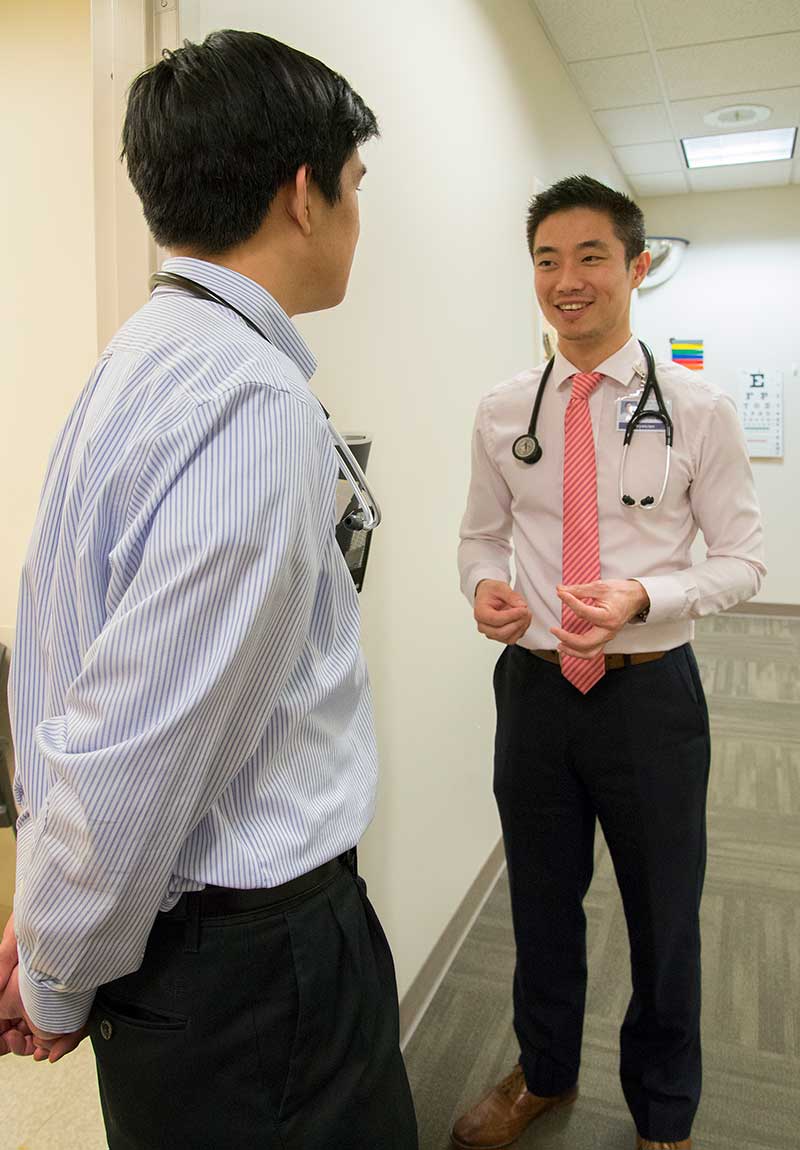

The UW Medicine Peer to Peer Program is here to support all members of our healthcare team. UW Medicine recognizes that there is a growing sense of burnout and emotional fatigue among healthcare workers. This can be due to specific events or to cumulative stressors. Through the Peer to Peer Program, UW Medicine aims to better support faculty, staff, and trainees when work/life can feel overwhelming.
Click here to request help from a peer supporter for yourself or a colleague.


About the Peer to Peer Program
The Peer to Peer Program is here to support our healthcare teams. There are many reasons someone might want to talk to a peer supporter. It could be a difficult death, or an adverse event. Perhaps you are finding less joy in your job or have a sense of emotional fatigue. The Peer to Peer Program is here to help! Peer supporters are clinicians who have been trained to be thoughtful, compassionate listeners.
This flyer and this brochure provide information and answers to frequently asked questions about the Peer to Peer Program for staff, faculty, and trainees.
View the Spring 2024 Four Year Review here.
Peer Supporter Nominations
If you want to nominate a colleague to be a Peer Supporter, please complete the nomination form.
An ideal Peer Supporter demonstrates good listening skills, resiliency and emotional intelligence; maintains professional boundaries; is trustworthy and maintains confidentiality. If this describes your colleague, then please tell us more about them in the nomination form. Your nomination will be reviewed by your local Peer Supporter Selection Committee.
About the Peer Supporter Role
Peer Supporters are volunteers who are trained to provide one-on-one confidential, emotional support as well as referrals to other support organizations as needed. A Peer Supporter will be dispatched within 24 hours of a request for support services being received. The Peer Supporter may email or call the individual in need of support to arrange a date and time to speak on the phone or meet in person. This is usually a one-time meeting with occasional, optional follow-up.
During this Peer to Peer meeting, the Peer Supporter mostly listens to their peer’s concerns and offers support without feeling the need to give advice. The team member being contacted with an offer of peer support can decide to participate or not – it is not a requirement and completely up to them. All contacted care team members are offered a basic information and resource brochure.
There may be times when a Peer Supporter thinks the care team member needs more support and our program will have these resources available to you to recommend (e.g. grief counseling, behavioral health, employee assistance program, etc.).
This document outlines the role of the peer supporter, including who can be a peer supporter and what is expected.
Peer Supporters who need information on training resources may access them here. Please note this resource is only for trained Peer Supporters.
Peer Support Resources
A Mindful State
The past two years have had an impact on our mental and emotional health. This is a place for all of us to come together, share our stories, get some useful advice and help each other build resilience.
Art With Impact
Art With Impact promotes mental wellness by creating space for people to learn and connect through art and media.
Found Down Podcast
A weekly show hosted by Nicole Johnson, RN full of untold nursing stories that are sometimes hilarious, macabre insane or anything in between.. an outlet and space for us. Rated E and is mature in content.
2nd Wednesday ER Nurses Support Group
Second Wednesday of each month from 3-430 pm starting March 9th, 2022. FREE and facilitated by a licensed trauma therapist to provide a safe space and skill-sharing, with high confidentiality. Space is limited to 8-10 people each group.
Call 360-951-0951 or email jbsky@att.net if interested.
ANA Well-being Initiative
Free Tools and Apps to Support Mental Health and Resilience from American Nurses Association.
WA State DOH Behavioral Impacts
Behavioral Health Resources & Recommendations: situation reports, monthly forecasts, “Coping with COVID” podcast and blog series.
Self-Compassion with Kristin Neff
Discussion groups, trainings, resources, practices, exercises, and other events.
Stress First Aid: Resources for Healthcare Providers
A framework to improve recovery from stress reactions, both in oneself and in coworkers: manual, workbook, online webinars & trainings.
UWMC Employee Discounts
Access to great money-saving offers. Here you can find everything from special pricing at local yoga studios to discounted international hotel stays and everything in between.
To receive discounts on all in-person purchases, you must present your Husky Card.
Live Another Day
Access to BIPOC focused mental health support and resources.
Greater Good Science Center
Studies the psychology, sociology, and neuroscience of well-being and teaches skills that foster a thriving, resilient, and compassionate society.
The Emotional PPE Project
Connects healthcare workers in need with licensed mental health professionals who can help. No cost. No insurance. Just a trained professional to talk to.
UW Medicine Resilience Programming
Fall/Winter Well-being and Resilience Curriculum (webinars) from Dr. Anne Browning.
The Trauma Stewardship Institute
Caring for self while caring for others: books, trainings, webinars and “Future Tripping” podcast with Laura van Dernoot Lipsky.
The Whole U Nutrition Resource Guide
Handouts on quick and easy recipes, drinks in a jar, navigating the grocery store, National Nutrition Month Cookbook, and more!
Replenish @ Work
Blog devoted to wellbeing rooted in compassion — the “how to’s” of self and mutual care at work. Created by Nurses for Nurses.
P2P Frequently Asked Questions
Who are the Peer Supporters? What do they offer?
Peer Supporters are your colleagues who were nominated and selected for this role because they are trusted by others and good listeners. They are trained to understand the need to maintain confidentiality and appropriate boundaries while providing one-on-one confidential, emotional support as well as referrals to other support services within UW Medicine or the community as needed.
How does someone become a Peer Supporter?
If you’d like to nominate one of your colleagues as a Peer Supporter, please complete a nomination form. We welcome nominations for Peer Supporters representing a variety of disciplines and services within the UW Medicine system. To learn more about the role of the Peer Supporter, please see the role description document under the resources section.
When would I access a Peer Supporter?
The Peer to Peer Program is here to support any member of our healthcare teams. You could need support after a patient passes away, when you are involved in an adverse event, or after a difficult interaction with a colleague. It might be that it feels hard to come to work and you are experiencing burnout or are finding less joy in your work. The Peer to Peer Program is here to help!
How do I access a Peer Supporter?
The easiest way to access the Peer to Peer Program is to submit a request form here. You can use this form to request peer support for yourself or to refer someone in need. In addition, after a known difficult clinical event, as a matter of routine, involved care team members may be contacted and offered peer support.
How will I be contacted?
A Staff Support Specialist* will contact you (or the person you referred) to match to a Peer Supporter or refer to the appropriate staff support service. The peer support match is based on UW Medicine entity, area of practice or department, clinical background, and availability. A designated peer supporter, who will only be given contact information, will contact the person in need of support to discuss how and when they would like to meet.
*Process may vary by entity/site
What happens next?
You can decide to speak on the phone or meet in person with the Peer Supporter. This is usually a one-time event but can include an occasional follow-up or referral to additional support. You will also be offered a basic information and resource brochure.
What should I expect from the one on one session?
In this session, you will meet with a colleague who understands the unique challenges of a career in healthcare. Their job is to listen and offer support, as opposed to review the details of an event or provide counseling. The Peer Supporter is someone to be there as you navigate a difficult time or situation.
Is this confidential?
Yes, the Peer Supporters maintain confidentiality (unless there are safety concerns for you, another individual, or a patient). When you meet with a Peer Supporter, the only people who will know that a conversation took place are you, the Peer Supporter, and the Staff Support Specialist.
Have you already experienced a peer support interaction?
If you have received peer support, please complete this anonymous survey with your feedback from the experience. Your feedback will help us improve the program.
For questions, please contact the Peer to Peer site coordinator at your site
  Anne Browning |
  Laura Sandberg |
  Alina Wahl |
  Shelley Wiechman |
Kelly Paananen |
  Kristina Toncray |
  Richard Shugerman |
  Andrea Kalus |
  Marie Cockerham |
  Maggie Mittler |
  Carolyn Houk |
  Pam Yung |
  Crystal Grimsey |
  Caitlin Harrington |
  Dani Dutro |
  Tally Teodosio |
  Trish Kritek |
If you have additional questions, please email us at uwmedpeertopeer@uw.edu
